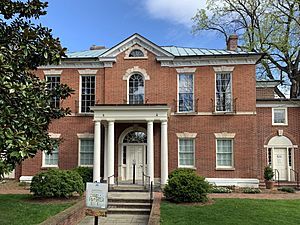National Society of the Colonial Dames of America facts for kids
 |
|

Dumbarton House is the Society's Headquarters in Georgetown, Washington, D.C.
|
|
| Abbreviation | NSCDA |
|---|---|
| Founded | April 8, 1891 |
| Type | Non-profit, lineage society |
| Focus | Historic preservation, education, patriotism |
| Headquarters | Dumbarton House |
|
Membership
|
15,000 |
| Publication | Dames in Uniform |
The National Society of The Colonial Dames of America, often called NSCDA, is a group for women in America. To join, a woman must be a descendant of someone who lived in an American Colony before 1776. This ancestor also needed to have provided important services during that time.
The NSCDA has 43 different groups across the country. Its main office is at Dumbarton House in Georgetown, Washington, D.C..
Contents
Discovering the NSCDA's History
The NSCDA was started in 1891. This was soon after a similar group, the Colonial Dames of America (CDA), was formed. The CDA was set up to have one main office in New York City.
The NSCDA, however, was planned differently. It was designed as a group of State Societies. This meant each state's group could make some of its own decisions. Another well-known group, the Daughters of the American Revolution, also started around this time.
The NSCDA began its work in historic preservation in 1897. Its New York group helped save the Van Cortlandt House. Since then, the NSCDA has worked to protect and share the stories of historic places.
What the NSCDA Does
The NSCDA has 43 local groups, called corporate societies. Their main office is at Dumbarton House in Washington, D.C.
Besides working with museums, the NSCDA also helps students. They offer scholarship programs. They also support other projects that focus on:
- Historic preservation: Saving old buildings and sites.
- Patriotic service: Showing love for their country.
- Education: Teaching people about American history.
The NSCDA owns or helps run many historic house museums. These are places where you can learn about the past. Some of these museums include:
- Andrew Low House, Savannah, Georgia
- Burgwin-Wright House, Wilmington, North Carolina
- Henry B. Clarke House, Chicago, Illinois
- Dumbarton House, Washington, DC (the main office)
- Governor Stephen Hopkins House, Providence, Rhode Island
- Gunston Hall, Mason Neck, Virginia
- Haywood Hall, Raleigh, North Carolina
- Old Indian Agency House, Portage, Wisconsin
- Hoover-Minthorn House, Newberg, Oregon
- Liberty Hall, Frankfort, Kentucky
- McElroy Octagon House, San Francisco, California
- Plum Grove Historic House, Iowa City, Iowa
- Stenton, Philadelphia, Pennsylvania
- Ximenez-Fatio House, St. Augustine, Florida
- Mount Clare, Baltimore, Maryland
- McAllister House Museum, Colorado Springs, Colorado
- Webb-Deane-Stevens Museum, Wethersfield, Connecticut
- Hotel de Paris Museum, Georgetown, Colorado
- Joel Lane Museum House, Raleigh, North Carolina
- Old First Presbyterian Church of Wilmington, Wilmington, Delaware
- Tate House, Portland, Maine
- Moffat-Ladd House, Portsmouth, New Hampshire
- Whitehall Museum House, Middletown, Rhode Island
- William Hickling Prescott House, Boston, Massachusetts
- Wilton House Museum, Richmond, Virginia
- Peachfield, Westampton, New Jersey
Famous Members of the NSCDA
Many notable women have been part of the NSCDA. They have made important contributions in various fields. Some of these members include:
- Helen Gilman Noyes Brown (1867–1942), a generous giver to good causes.
- Carol Cadou, a museum expert who led the society from 2021 to 2024.
- Ruth Coltrane Cannon (1891–1965), known for saving historic places and her giving.
- Sarah Johnson Cocke (1865–1944), a writer and community leader.
- Alice Creelman (1858–1952), an artist and art seller.
- Mary Mayo Crenshaw (1875–1951), an author.
- Ella Loraine Dorsey (1853–1935), a writer, journalist, and translator.
- Marion Moncure Duncan (1913–1978), a businesswoman and leader of lineage societies.
- Grace Gemberling (1903–1997), a painter.
- Anne Lyon Haight (1891–1977), an author, essayist, and collector.
- Mary Hilliard Hinton (1869–1961), a painter, historian, and opponent of women's right to vote.
- Jane Tunstall Lingo (1924–2007), a journalist and socialite.
- Anne Hazen McFarland (1868–1930), a doctor and editor of a medical magazine.
- Florence MacKubin (1857–1918), a portrait painter.
- Mary Martha Presley Merritt (died 1994), a politician.
- Mary Lane Morrison (1907–1994), a writer, historian, and preservationist.
- Theodora Agnes Peck (1882–1964), an author and poet.
- Isabel Weld Perkins (1876–1948), an heiress, author, and host of social events.
- Delia Lyman Porter (1858–1933), an author, social reformer, and club member.
- Sara Agnes Rice Pryor (1830–1912), a writer and community activist.
- Sarah Corbin Robert (1886–1972), an expert on meeting rules.
- Eron Rowland (1861/2–1951), a historian and author.
- Marion Margery Scranton (1884–1960), an activist for women's right to vote.
- Annie Bartlett Shepard (1861–1944), an American who opposed women's right to vote.
- Sarah Logan Wister Starr (1873–1956), a person who helped others.
- Lilian Carpenter Streeter (1854–1935), a social reformer and author.
- Presley Merritt Wagoner, the 40th President General of the DAR.
- Eva Ingersoll Wakefield (1892–1970), a writer and poet.
- Margaret Anderson Watts (1832–1905), a social reformer.
- May Rogers Webster (1873–1938), a naturalist.
- Anne Hollingsworth Wharton (1845–1928), a writer and historian.
- Helen M. Winslow (1851–1938), an editor, author, publisher, and journalist.
- Anna Wolcott (1868–1928), an educator.
- Frances Fisher Wood (1852–1938), an educator, lecturer, and scientist.
- Mary van Kleeck (1883–1972), a social scientist and feminist.
Related Groups to Explore
If you are interested in the NSCDA, you might also like to learn about these groups:
- Sons of the American Revolution (SAR)
- Children of the American Revolution (C.A.R.)
- The Mayflower Society
- Society of the Cincinnati
- Southern Dames of America

